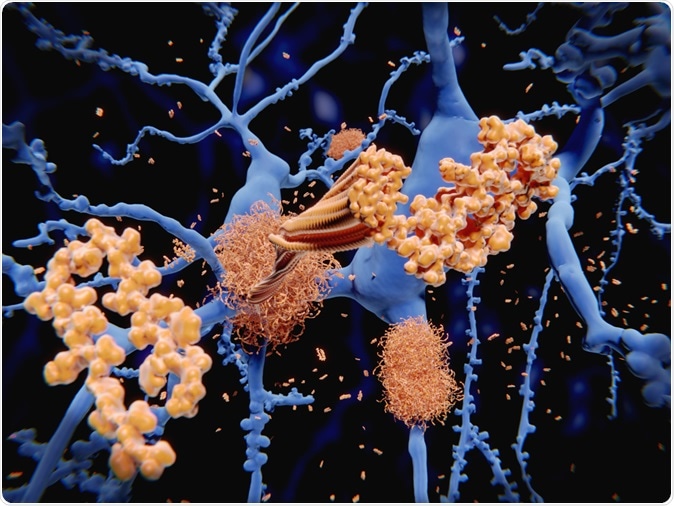Researchers have found that surgical instruments used for neurosurgery could get contaminated by the altered brain proteins that are seen in Alzheimer’s disease. These instruments are capable of spreading the condition if not treated or decontaminated properly before reuse. The study results were published in the latest issue of the journal Nature.
Prof John Collinge, director of the Medical Research Council prion unit at University College London, who was one of the team of researchers said that Alzheimer’s was never known to be a contagious disease.

Alzheimer's disease: the amyloid-beta peptide accumulates to amyloid fibrils that build up dense amyloid plaques. 3d rendering. Image Credit: Juan Gaertner / Shutterstock
However, there is a small chance that the harmful proteins that form deposits in the brains of people with Alzheimer’s could spread through brain surgery to other individuals. He said in a statement, “We don’t know if any cases of Alzheimer’s disease are related to medical or surgical procedures, but in my view we should take a precautionary approach.”
Alzheimer’s disease is a severe form of dementia that leads to a progressive loss of cognitive and memory functions of the brain. Pathologically there is a buildup and plaque deposits of toxic proteins called amyloid beta plaques and tau protein tangles within the brains and nerve cells. Over half a million Britons suffer from Alzheimer’s disease. Creutzfeldt-Jakob disease (CJD) is a brain condition that is also called “mad cow disease”. It spreads by a toxic protein called prion protein.
The team of researchers had started out by investigating the brains of some patients who had earlier died of CJD. These patients were all found to have been injected with a growth hormone preparation that was meant to correct their stunted growth and growth hormone deficiency. The hormone preparation in question was made by pooling extracts from the pituitary glands of thousands of people.
The extract was injected into around 30,000 children who had growth hormone deficiency between 1958 and 1985. Some of these patients who developed CJD were found to also have a condition called cerebral amyloid angiopathy (CAA).
CAA was found to be related to Alzheimer’s disease. The difference between CAA and Alzheimer’s is that in the former the amyloid plaques get deposited in the brain’s blood vessels while in the latter they are deposited in the nerve cells.
The team during their investigation looked at old vials that contained growth hormone that was contaminated with CJD protein. They were looking for precursor proteins of tau and amyloid. They noted that some of the vials contained such precursors and these hormone samples were all drawn from the donors using a particular technique.
In their next step the team injected these contaminated hormone samples into the brains of genetically modified lab mice. These mice were modified in such a manner that they would be able to make human amyloid beta proteins.
Results showed that these experimental mice soon started developing clumps of amyloid beta protein in their brain and also developed CAA. This meant that the “amyloid seeds” from the contaminated hormone was capable of causing formation of clumps of amyloid beta protein in the brains of the mice that is indicative of Alzheimer’s pathology. Collinge said, “With CAA and probably with Alzheimer’s disease there may be certain circumstances, though hopefully rare, that transmission of the pathology can occur.”
The team speculates that the spread could be due to contaminated neurosurgery. Transfusions may not be a major risk says Collinge. He added, “I think it’s important we do further research on this and develop new ways to remove these seeds, so any risk that is there is removed.” “We ought to be doing epidemiological studies to see if there is any link between these medical procedures and Alzheimer’s disease.
We can also think about better means to decontaminate surgical instruments to remove this risk. It’s a small risk, and a risk of something happening 20 years after exposure, but in my view you want to be doing research to remove that risk... if we can avoid any transmission of CAA or Alzheimer’s disease we should do it, even if it’s only a handful of people who are at risk,” he said.
David Holtzman and Tien-Phat Huynh at Washington University in St Louis wrote in an accompanying article with the study, “It is crucial that surgical instruments that come into contact with the human brain are appropriately treated to remove seeds of misfolded forms of peptides and proteins.”